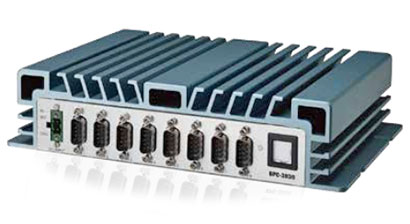|
Winmate EAC-BY3030 Fanless Embedded Box PC
Intel "Bay Trail" based industrial computer serves in a wide variety of machine-to-machine applications
(by Conrad H. Blickenstorfer, May 2015)
Winmate's EAC-BY3030 is a compact fanless embedded Box PC that was introduced in April 2015. Designed for a wide variety of industrial automation or machine-to-machine applications, the fanless device measures a modest 9.4 x 6.5 inches and stands 2.2 inches tall. And that's including the voluminous passive cooling fins. And note that there are no fewer than eight DB9 serial ports!

The EAC-BY3030 is actually part of a whole series of small, boxy industrial embedded PCs Winmate has been introducing over time (see newsletter). All are designed for specific industrial applications that require the most compact size possible, exemplary durability, superior reliability, and just the right level of performance for the job.
That job may be in manufacturing, industrial automation, medical projects, semiconductor, food processing, machine control, and other scenarios where regular desktop and notebook computers just aren't feasible, or wouldn't last. These compact industrial PCs, on the other hand, are built to work in extreme heat and cold.
Another thing that sets industrial PCs apart is that many of them are very specialized. Instead of being jacks of all trades with one-size-fits-all performance and connectivity, IPC may heavily concentrate on certain specific types of connectivity. The Winmate EAC-BY3030 is a good example: whereas most contemporary consumer desktops or laptops no longer even have serial ports, this purpose-designed IPC has no fewer than eight, four RS232 and four multi-purpose and presumably jumper-switchable RS232/422/485.
In addition, users get two USB 2.0 ports, two USB 3.0 port, two gigabit RJ45 LAN ports, VGA and HDMI, and an audio line. Internal expansion is possible via a half-size mini-PCIe slot.
Powered by Intel Bay Trail
As is the case with an increasing number of industrial PCs, the Winmate EAC-BY3030 is based on one of Intel's expansive line of "Bay Trail" processors.
Bay Trail is interesting insofar as it is the first true architectural update to Intel's Atom processor architecture since the line's introduction in 2008. Codenamed "Silvermont," the processor cores used in the Bay Trail platform include a variety of features previously only avalable in Intel's higher end Core processors. Examples are Turbo Boost (here called "burst frequency), which can increase the speed of both CPU and GPU cores as long as there is thermal (and power) headroom available, and also a version of the highly touted "active idle" feature pioneered in Intel's 4th generation "Haswell" Core processors. Active idle reduces the amount of time the computer needs to enter and exit idle states, facilitating much more economical operation.
Bay Trail chips, which include up to four Silvermont cores, offer another first in ultra-mobile Intel SoC (System on Chip)—they include Intel's own graphics processor technology, leveraging the same HD 4000 GPU architecture as is used in Intel's 3rd generation "Ivy Bridge" Core processors, albeit in a less powerful implementation with fewer execution units and lower GPU clock speeds. Still, that's a big step forward. Bay Trail supports DirectX 11, OpenGL ES 3.X, and OpenCL 1.2 on the API side, and full 1080p video on HDMI.
Another big change is that Bay Trail processors are marketed under various Intel brand names—the Atom name is used for processors targeted at small systems with maximum battery life, but there are also Bay Trail processors carrying the Celeron and Pentium brand names. Those are geared towards higher performance devices that require more than traditional Atom power, but do not need the features (and price) of a Core processor.
For the EAC-BY3030 Box PC, Winmate selected the Celeron J1900, a quad-core processor running at 2.00GHz, and capable of bursts up to 2.42GHz. Thanks to Silvermont's 22nm manufacturing technology, maximum Thermal Design Power is just 10 watts, roughly at the same range of prior generation higher-end Atom chips, and considerably lower than that of even low-voltage Intel Core processors, which start at 15 watts (and cost a lot more). For detailed specs of the Celeron J1900, see here.
We haven't had hands-on testing with the EAC-BY3030 yet, but based on benchmarks with other Celeron J1900-based industrial PC systems we've had in the RuggedPCReview.com lab, expect performance roughly equal to that of a competent Core 2 Duo system of just a few years ago, and much higher than any older Atom-based system.
On the memory side, the EAC-BY3030 comes with up to 8GB of low voltage DDR3L RAM. Standard mass storage is a 64GB 2.5-inch solid state disk, though we're not sure of what type.
Ruggedness
As far as ruggedness and durability go, embedded industrial systems have different requirements from mobile systems. Vibration and shock resistance are important as industrial mounted systems may be subjected to them. The EAC-BY3030's -4 to 140 degree Fahrenheit operating temperature range allows deployment in a very wide range of settings, including industrial freezers and such. Winmate doesn't list an ingress protection rating.
Winmate is a Taiwanese company founded in 1994. Specializing in industrial display technologies and solutions, Winmate also branched out into Tablet PCs, digital signage, rugged Mobile PCs, embedded automation controllers, marine grade displays and computers, and Panel PCs such as the Stainless Panel PC shown here.
Contact Winmate:
Web: www.winmate.com.tw
Email: sales1 @ winmate.com.tw
OEM/ODM Contact: ODM@winmate.com.tw
|





